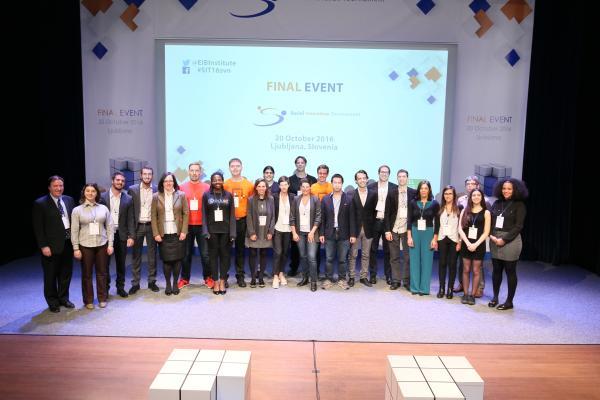
Aprendices Visuales (Visual Learners), from France/Spain, and BioCarbon Engineering from the UK have been awarded the first and second prizes in the fifth edition of the Social Innovation Tournament, a competition organised by the European Investment Bank Institute to reward and promote innovative initiatives with a social, ethical or environmental impact in the fight against social exclusion.
This year’s edition took place on 20 October in Ljubljana, Slovenia, in cooperation with the Faculty of Economics and the Social Entrepreneurship Centre of the University of Ljubljana, and the Slovenian Ministry of Economic Development and Technology.
Silent Secret, from the UK, and FitforKids, from Denmark, won the first and second prizes in the Special Category on health (with a special emphasis on childhood obesity).
Aprendices Visuales, an initiative that aims to facilitate children with autism’s access to the tools they need in order to develop their full potential, through research, creation of e-learning tools and social awareness, and Silent Secret, an application for teenagers (11 to 19 year olds) to share secrets, thoughts, news and their lifestyle anonymously and access in-app counseling from professionals, thus creating a social community received EUR 50 000. Aprendices Visuales also won a voucher to receive subsequent advice from EY Transaction Advisory Services in Brussels.
BioCarbon engineering an initiative that wants to counter industrial scale deforestation using drones and FitforKids which is a programme specifically designed for obese children and their families promoting healthy eating habits and an active lifestyle, each received EUR 20 000.
In addition, four projects – Edukit, Freebird Club, Lazzus and Rés do Chão – won a voucher to receive subsequent mentoring services to help take the project forward. And for the first time this year the EIB Institute is partnering with INSEAD Business School to offer Ithaca from Greece and Aprendices Visuales from France/Spain the opportunity to attend the INSEAD Social Entrepreneurship programme.
Also this year for the first time, selected finalists in previous editions of the SIT will be invited to an innovative one-week executive education programme to be held in Lisbon in December in collaboration with the Católica-Lisbon School of Business & Economics of the Universidade Católica Portuguesa. The programme also includes an “Investors’ Fair” designed to showcase projects for potential investors and build bridges for future investment deals.
Dr Miro Cerar, Prime Minister of the Republic of Slovenia, said: “The 15 finalists are among the best social innovators in Europe, because of their modern business ideas and socially responsible business models. With their creativity, they are the drivers of our development and progress ‘train‘. I therefore hope that they will first help us to meet key social challenges – like the creation and development of new quality jobs, migration, and gender equality – which are today facing not only Slovenia but also Europe.”
Francisco de Paula Coelho, Dean of the European Investment Bank Institute, said: “This tournament is about Europe’s best social innovators, and the projects that were presented to us today reveal the great potential of untapped social innovation that is available in Europe. In only five years, the Institute’s Social innovation tournament has succeeded in creating a growing community of social entrepreneurs from 20 different countries working to combat social exclusion through more than 60 projects. That is quite an achievement.”
Sophie Robin, President of the Jury, said “The best projects have won, but it was a very difficult decision to make. We thank all the finalists for their participation and for the quality of their projects, and I thank the Institute for organising this competition”
The Social Innovation Tournament was established in 2012 by the EIB Institute. It is held every year in a different country to reward and sponsor European entrepreneurs whose primary purpose is to generate a social, ethical or environmental impact. Projects are typically related to combating unemployment and the marginalisation of disadvantaged communities and promoting access to education.
Fifteen finalists from ten countries had initially been selected for the Tournament from 282 proposals submitted by applicants from 30 countries.
During the Tournament, the finalists had to present and defend their project before a Jury composed of seven social innovation specialists chaired by Sophie Robin (Stone Soup Consulting) and also including José Tomás Frade (former EIB staff member), Elena Casolari (OPES Impact Fund), Alenka Slavec (University of Ljubljana) and Hans Wahl (INSEAD).
The next Social Innovation Tournament will take place in Riga, Latvia, with the call for projects scheduled to start in February 2017. In 2017, the Special Category Prizes will go to projects focusing on ageing.